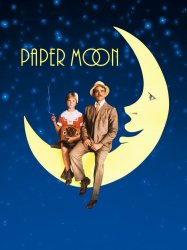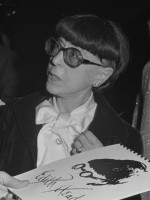Bing Crosby is a Actor, Director, Scriptwriter, Producer and Thanks American born on 3 may 1903 at Tacoma (USA)

Harry Lillis "Bing" Crosby, Jr. (May 3, 1903 – October 14, 1977) was an American singer and actor. Crosby's trademark warm bass-baritone voice made him the best-selling recording artist of the 20th century, having close to a billion records, tapes, compact discs and digital downloads around the world.
The first multimedia star, from 1934 to 1954 Crosby was a leader in record sales, radio ratings, and motion picture grosses. His early career coincided with technical recording innovations such as the microphone. This allowed him to develop a laid-back, intimate singing style that influenced many of the popular male singers who followed him, including Perry Como, Frank Sinatra, and Dean Martin. Yank magazine recognized Crosby as the person who had done the most for American G.I. morale during World War II and, during his peak years, around 1948, American polls declared him the "most admired man alive", ahead of Jackie Robinson and Pope Pius XII. Also in 1948, the Music Digest estimated that Crosby recordings filled more than half of the 80,000 weekly hours allocated to recorded radio music.
Crosby won an Academy Award for Best Actor for his role as Father Chuck O'Malley in the 1944 motion picture Going My Way, and was nominated for his reprise of the role in The Bells of St. Mary's opposite Ingrid Bergman the next year, becoming the first of four actors to be nominated twice for playing the same character. In 1963, Crosby received the first Grammy Global Achievement Award. He is one of the 22 people to have three stars on the Hollywood Walk of Fame (a star for motion pictures, radio, and audio recording).
Crosby also exerted an important influence on the development of the postwar recording industry. He became the first performer to pre-record his radio shows and master his commercial recordings onto magnetic tape. Through the medium of recording, Crosby constructed his radio programs with the same directorial tools and craftsmanship (editing, retaking, rehearsal, time shifting) used in motion picture production, which became the industry standard. In addition to his work with early tape recording, he helped to finance the development of videotape, bought television stations, bred racehorses, and co-owned the Pittsburgh Pirates baseball team.
Crosby was a registered Republican, and actively campaigned for Wendell Willkie in 1940 against President Roosevelt, arguing that no man should serve more than two terms in the White House. After Willkie lost, Crosby decreed that he would never again make any open political contributions.
Crosby reportedly had an alcohol problem in his youth, and may have been dismissed from Paul Whiteman's orchestra because of it, but he later got a handle on his drinking. According to Giddins, Crosby told his son Gary to stay away from alcohol, adding, "It killed your mother."
After Crosby's death, his eldest son, Gary, wrote a highly critical memoir, Going My Own Way, depicting his father as cruel, cold, remote, and both physically and psychologically abusive.
Gary Crosby wrote:
We had to keep a close watch on our actions... When one of us left a sneaker or pair of underpants lying around, he had to tie the offending object on a string and wear it around his neck until he went off to bed that night. Dad called it "the Crosby lavalier". At the time the humor of the name escaped me...
"Satchel Ass" or "Bucket Butt" or "My Fat-assed Kid". That's how he introduced me to his cronies when he dragged me along to the studio or racetrack... By the time I was ten or eleven he had stepped up his campaign by adding lickings to the regimen. Each Tuesday afternoon he weighed me in, and if the scale read more than it should have, he ordered me into his office and had me drop my trousers... I dropped my pants, pulled down my undershorts and bent over. Then he went at it with the belt dotted with metal studs he kept reserved for the occasion. Quite dispassionately, without the least display of emotion or loss of self-control, he whacked away until he drew the first drop of blood, and then he stopped. It normally took between twelve and fifteen strokes. As they came down I counted them off one by one and hoped I would bleed early...
When I saw Going My Way I was as moved as they were by the character he played. Father O'Malley handled that gang of young hooligans in his parish with such kindness and wisdom that I thought he was wonderful too. Instead of coming down hard on the kids and withdrawing his affection, he forgave them their misdeeds, took them to the ball game and picture show, taught them how to sing. By the last reel, the sheer persistence of his goodness had transformed even the worst of them into solid citizens. Then the lights came on and the movie was over. All the way back to the house I thought about the difference between the person up there on the screen and the one I knew at home.
Younger son Phillip vociferously disputed his brother Gary's claims about their father. Around the time Gary made his claim, Phillip stated to the press that "Gary is a whining...crybaby, walking around with a 2-by-4 and just daring people to nudge it off." However, Phillip did not deny that Crosby believed in corporal punishment. In an interview with People, Phillip stated that "we never got an extra whack or a cuff we didn't deserve." During a later interview conducted in 1999 by the Globe, Phillip said:
My dad was not the monster my lying brother said he was; he was strict, but my father never beat us black and blue, and my brother Gary was a vicious, no-good liar for saying so. I have nothing but fond memories of Dad, going to studios with him, family vacations at our cabin in Idaho, boating and fishing with him. To my dying day, I'll hate Gary for dragging Dad's name through the mud. He wrote Going My Own Way out of greed. He wanted to make money and knew that humiliating our father and blackening his name was the only way he could do it. He knew it would generate a lot of publicity. That was the only way he could get his ugly, no-talent face on television and in the newspapers. My dad was my hero. I loved him very much. He loved all of us too, including Gary. He was a great father.
However, Dennis and Lindsay Crosby confirmed that their father was physically abusive. Lindsay added, "I'm glad [Gary] did it. I hope it clears up a lot of the old lies and rumors." Unlike Gary, however, Lindsay said that he preferred to remember "all the good things I did with my dad and forget the times that were rough." Dennis asserted that the book was "Gary's business" and a result of his "anger," but would not deny the book's claims. Bing's younger brother, singer and jazz bandleader Bob Crosby, recalled at the time of Gary's revelations that Bing was a "disciplinarian," as their mother and father had been. He added, "We were brought up that way." In an interview for the same article, Gary clarified that Bing was abusive as a means of administering punishment: "He was not out to be vicious, to beat children for his kicks."
However, late in his life, Gary claimed that he made up large portions of the book in an attempt to blame his irresponsible life decisions on his father. Bing Crosby's website says:
However, several years after Bing died, Doubleday approached Gary to write an autobiography. To guarantee success, he was asked to wildly exaggerate Bing’s self-acknowledged paternal strictness. Going My Own Way, published in 1983 and co-authored by Ross Firestone, was Gary’s controversial attempt to transfer his professional and personal shortcomings onto his father; and to achieve the long desired leading role – playing Bing, no less – should his book be adapted to the screen. This wasn’t to be, as the book created considerable turmoil within the Crosby family. Subsequently, Gary recanted large portions of his unfortunate memoir. To further the rehabilitation Gary decided in 1995 to record an album overdubbing his father’s classic recordings. This came too late. With one side complete, a persistent cough interfered with the endeavor. A doctor’s visit confirmed that he had advanced lung cancer. Gary died on August 24, 1995.
It was revealed that Crosby's will had established a blind trust, with none of the sons receiving an inheritance until they reached the age of 65.
Lindsay Crosby died in 1989 and Dennis Crosby died in 1991, both by suicide from self-inflicted gunshot wounds, at ages 51 and 56, respectively. Gary Crosby died in 1995 at the age of 62 of lung cancer and 69-year-old Phillip Crosby died in 2004 of a heart attack.
Widow Kathryn Crosby dabbled in local theater productions intermittently, and appeared in television tributes to her late husband.
Nathaniel Crosby, Crosby's youngest son from his second marriage, was a high-level golfer who won the U.S. Amateur at age 19 in 1981, at the time the youngest-ever winner of that event. Harry Crosby is an investment banker who occasionally makes singing appearances.
Denise Crosby, Dennis Crosby's daughter, is also an actress and is known for her role as Tasha Yar on Star Trek: The Next Generation, and for the recurring role of the Romulan Sela (daughter of Tasha Yar) after her withdrawal from the series as a regular cast member. She also appeared in the film adaptation of Stephen King's novel Pet Sematary. In 2006, Crosby's niece, Carolyn Schneider, published the laudatory book Me and Uncle Bing.
There have been disputes between Crosby's two families beginning in the late 1990s. When Dixie died in 1952, her will provided that her share of the community property be distributed in trust to her sons. After Crosby's death in 1977, he left the residue of his estate to a marital trust for the benefit of his widow, Kathryn, and HLC Properties, Ltd., was formed for the purpose of managing his interests, including his right of publicity. In 1996, Dixie's trust sued HLC and Kathryn for declaratory relief as to the trust's entitlement to interest, dividends, royalties, and other income derived from the community property of Crosby and Dixie. In 1999, the parties settled for approximately $1.5 million. Relying on a retroactive amendment to the California Civil Code, Dixie's trust brought suit again, in 2010, alleging that Crosby's right of publicity was community property, and that Dixie's trust was entitled to a share of the revenue it produced. The trial court granted Dixie's trust's claim. The California Court of Appeal reversed, however, holding that the 1999 settlement barred the claim. In light of the court's ruling, it was unnecessary for the court to decide whether a right of publicity can be characterized as community property under California law.
Source : Wikidata
Bing Crosby

- Infos
- Photos
- Best films
- Family
- Characters
- Awards
Birth name Harry Lillis Crosby
Nationality USA
Birth 3 may 1903 at Tacoma (USA)
Death 14 october 1977 (at 74 years) at La Moraleja (Espagne)
Awards Academy Award for Best Actor, Grammy Lifetime Achievement Award, Peabody Award
Nationality USA
Birth 3 may 1903 at Tacoma (USA)
Death 14 october 1977 (at 74 years) at La Moraleja (Espagne)
Awards Academy Award for Best Actor, Grammy Lifetime Achievement Award, Peabody Award
The first multimedia star, from 1934 to 1954 Crosby was a leader in record sales, radio ratings, and motion picture grosses. His early career coincided with technical recording innovations such as the microphone. This allowed him to develop a laid-back, intimate singing style that influenced many of the popular male singers who followed him, including Perry Como, Frank Sinatra, and Dean Martin. Yank magazine recognized Crosby as the person who had done the most for American G.I. morale during World War II and, during his peak years, around 1948, American polls declared him the "most admired man alive", ahead of Jackie Robinson and Pope Pius XII. Also in 1948, the Music Digest estimated that Crosby recordings filled more than half of the 80,000 weekly hours allocated to recorded radio music.
Crosby won an Academy Award for Best Actor for his role as Father Chuck O'Malley in the 1944 motion picture Going My Way, and was nominated for his reprise of the role in The Bells of St. Mary's opposite Ingrid Bergman the next year, becoming the first of four actors to be nominated twice for playing the same character. In 1963, Crosby received the first Grammy Global Achievement Award. He is one of the 22 people to have three stars on the Hollywood Walk of Fame (a star for motion pictures, radio, and audio recording).
Crosby also exerted an important influence on the development of the postwar recording industry. He became the first performer to pre-record his radio shows and master his commercial recordings onto magnetic tape. Through the medium of recording, Crosby constructed his radio programs with the same directorial tools and craftsmanship (editing, retaking, rehearsal, time shifting) used in motion picture production, which became the industry standard. In addition to his work with early tape recording, he helped to finance the development of videotape, bought television stations, bred racehorses, and co-owned the Pittsburgh Pirates baseball team.
Biography
Crosby was married twice. His first wife was actress/nightclub singer Dixie Lee, to whom he was married from 1930 until her death from ovarian cancer in 1952; they had four sons: Gary, twins Dennis and Phillip, and Lindsay. The 1947 Susan Hayward film, Smash-Up: The Story of a Woman, is indirectly based on Lee's life. Bing and Dixie along with their children lived at 10500 Camarillo Street in North Hollywood for over five years. After her death, Crosby had relationships with model/Goldwyn Girl Pat Sheehan (who married his son Dennis in 1958) and actresses Inger Stevens and Grace Kelly before marrying the actress Kathryn Grant, who converted to Catholicism, in 1957. They had three children: Harry Lillis III (who played Bill in Friday the 13th), Mary (best known for portraying Kristin Shepard, who shot J. R. Ewing on TV's Dallas), and Nathaniel (the 1981 U.S. Amateur champion in golf).Crosby was a registered Republican, and actively campaigned for Wendell Willkie in 1940 against President Roosevelt, arguing that no man should serve more than two terms in the White House. After Willkie lost, Crosby decreed that he would never again make any open political contributions.
Crosby reportedly had an alcohol problem in his youth, and may have been dismissed from Paul Whiteman's orchestra because of it, but he later got a handle on his drinking. According to Giddins, Crosby told his son Gary to stay away from alcohol, adding, "It killed your mother."
After Crosby's death, his eldest son, Gary, wrote a highly critical memoir, Going My Own Way, depicting his father as cruel, cold, remote, and both physically and psychologically abusive.
Gary Crosby wrote:
We had to keep a close watch on our actions... When one of us left a sneaker or pair of underpants lying around, he had to tie the offending object on a string and wear it around his neck until he went off to bed that night. Dad called it "the Crosby lavalier". At the time the humor of the name escaped me...
"Satchel Ass" or "Bucket Butt" or "My Fat-assed Kid". That's how he introduced me to his cronies when he dragged me along to the studio or racetrack... By the time I was ten or eleven he had stepped up his campaign by adding lickings to the regimen. Each Tuesday afternoon he weighed me in, and if the scale read more than it should have, he ordered me into his office and had me drop my trousers... I dropped my pants, pulled down my undershorts and bent over. Then he went at it with the belt dotted with metal studs he kept reserved for the occasion. Quite dispassionately, without the least display of emotion or loss of self-control, he whacked away until he drew the first drop of blood, and then he stopped. It normally took between twelve and fifteen strokes. As they came down I counted them off one by one and hoped I would bleed early...
When I saw Going My Way I was as moved as they were by the character he played. Father O'Malley handled that gang of young hooligans in his parish with such kindness and wisdom that I thought he was wonderful too. Instead of coming down hard on the kids and withdrawing his affection, he forgave them their misdeeds, took them to the ball game and picture show, taught them how to sing. By the last reel, the sheer persistence of his goodness had transformed even the worst of them into solid citizens. Then the lights came on and the movie was over. All the way back to the house I thought about the difference between the person up there on the screen and the one I knew at home.
Younger son Phillip vociferously disputed his brother Gary's claims about their father. Around the time Gary made his claim, Phillip stated to the press that "Gary is a whining...crybaby, walking around with a 2-by-4 and just daring people to nudge it off." However, Phillip did not deny that Crosby believed in corporal punishment. In an interview with People, Phillip stated that "we never got an extra whack or a cuff we didn't deserve." During a later interview conducted in 1999 by the Globe, Phillip said:
My dad was not the monster my lying brother said he was; he was strict, but my father never beat us black and blue, and my brother Gary was a vicious, no-good liar for saying so. I have nothing but fond memories of Dad, going to studios with him, family vacations at our cabin in Idaho, boating and fishing with him. To my dying day, I'll hate Gary for dragging Dad's name through the mud. He wrote Going My Own Way out of greed. He wanted to make money and knew that humiliating our father and blackening his name was the only way he could do it. He knew it would generate a lot of publicity. That was the only way he could get his ugly, no-talent face on television and in the newspapers. My dad was my hero. I loved him very much. He loved all of us too, including Gary. He was a great father.
However, Dennis and Lindsay Crosby confirmed that their father was physically abusive. Lindsay added, "I'm glad [Gary] did it. I hope it clears up a lot of the old lies and rumors." Unlike Gary, however, Lindsay said that he preferred to remember "all the good things I did with my dad and forget the times that were rough." Dennis asserted that the book was "Gary's business" and a result of his "anger," but would not deny the book's claims. Bing's younger brother, singer and jazz bandleader Bob Crosby, recalled at the time of Gary's revelations that Bing was a "disciplinarian," as their mother and father had been. He added, "We were brought up that way." In an interview for the same article, Gary clarified that Bing was abusive as a means of administering punishment: "He was not out to be vicious, to beat children for his kicks."
However, late in his life, Gary claimed that he made up large portions of the book in an attempt to blame his irresponsible life decisions on his father. Bing Crosby's website says:
However, several years after Bing died, Doubleday approached Gary to write an autobiography. To guarantee success, he was asked to wildly exaggerate Bing’s self-acknowledged paternal strictness. Going My Own Way, published in 1983 and co-authored by Ross Firestone, was Gary’s controversial attempt to transfer his professional and personal shortcomings onto his father; and to achieve the long desired leading role – playing Bing, no less – should his book be adapted to the screen. This wasn’t to be, as the book created considerable turmoil within the Crosby family. Subsequently, Gary recanted large portions of his unfortunate memoir. To further the rehabilitation Gary decided in 1995 to record an album overdubbing his father’s classic recordings. This came too late. With one side complete, a persistent cough interfered with the endeavor. A doctor’s visit confirmed that he had advanced lung cancer. Gary died on August 24, 1995.
It was revealed that Crosby's will had established a blind trust, with none of the sons receiving an inheritance until they reached the age of 65.
Lindsay Crosby died in 1989 and Dennis Crosby died in 1991, both by suicide from self-inflicted gunshot wounds, at ages 51 and 56, respectively. Gary Crosby died in 1995 at the age of 62 of lung cancer and 69-year-old Phillip Crosby died in 2004 of a heart attack.
Widow Kathryn Crosby dabbled in local theater productions intermittently, and appeared in television tributes to her late husband.
Nathaniel Crosby, Crosby's youngest son from his second marriage, was a high-level golfer who won the U.S. Amateur at age 19 in 1981, at the time the youngest-ever winner of that event. Harry Crosby is an investment banker who occasionally makes singing appearances.
Denise Crosby, Dennis Crosby's daughter, is also an actress and is known for her role as Tasha Yar on Star Trek: The Next Generation, and for the recurring role of the Romulan Sela (daughter of Tasha Yar) after her withdrawal from the series as a regular cast member. She also appeared in the film adaptation of Stephen King's novel Pet Sematary. In 2006, Crosby's niece, Carolyn Schneider, published the laudatory book Me and Uncle Bing.
There have been disputes between Crosby's two families beginning in the late 1990s. When Dixie died in 1952, her will provided that her share of the community property be distributed in trust to her sons. After Crosby's death in 1977, he left the residue of his estate to a marital trust for the benefit of his widow, Kathryn, and HLC Properties, Ltd., was formed for the purpose of managing his interests, including his right of publicity. In 1996, Dixie's trust sued HLC and Kathryn for declaratory relief as to the trust's entitlement to interest, dividends, royalties, and other income derived from the community property of Crosby and Dixie. In 1999, the parties settled for approximately $1.5 million. Relying on a retroactive amendment to the California Civil Code, Dixie's trust brought suit again, in 2010, alleging that Crosby's right of publicity was community property, and that Dixie's trust was entitled to a share of the revenue it produced. The trial court granted Dixie's trust's claim. The California Court of Appeal reversed, however, holding that the 1999 settlement barred the claim. In light of the court's ruling, it was unnecessary for the court to decide whether a right of publicity can be characterized as community property under California law.
Best films
Usually with
Filmography of Bing Crosby (104 films)
Actor

That's Entertainment! III (1994)
, 1h53Genres Documentary, Musical
Themes Films about films, Documentary films about business, Documentary films about the film industry, Documentary films about cities, Musical films, Documentary films about films
Actors Gene Kelly, June Allyson, Cyd Charisse, Lena Horne, Howard Keel, Esther Williams
Roles (archive footage)
Rating74%





Troisième volet de "Il était une fois Hollywood", "That's Entertainment III" nous propose un nouveau panorama de l'age d'or de la MGM mais aussi des chutes rarissimes, des séquences coupées lors de la sortie des films et des essais d'autres stars que celles qui furent finalement choisies.
 , 1h29
, 1h29Origin USA
Genres War, Documentary, Animation
Themes Children's films
Actors Leonard Maltin, Mel Blanc, Billy Bletcher, Bea Benaderet, Bing Crosby, Robert C. Bruce
Roles Crosby rooster
Rating76%





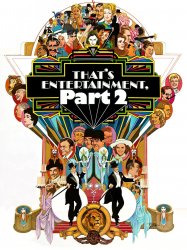 , 2h13
, 2h13Directed by Gene Kelly
Origin USA
Genres Documentary, Musical
Themes Films about films, Films about music and musicians, Documentary films about business, Documentary films about the film industry, Documentary films about cities, Musical films, Documentary films about films
Actors Fred Astaire, Gene Kelly, Bud Abbott, Lou Costello, Lew Ayres, Stan Laurel
Roles (archive footage)
Rating72%





Gene Kelly et Fred Astaire présentent les meilleurs moments des films de la MGM.
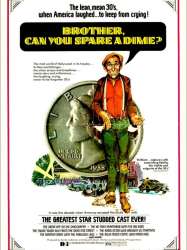 , 1h50
, 1h50Directed by Philippe Mora
Origin United-kingdom
Genres Documentary, Historical
Themes Documentary films about historical events
Actors Walt Disney, Bing Crosby, Marlene Dietrich, Charlie Chaplin, Fred Astaire, James Dunn
Roles Self (archive footage)
Rating70%





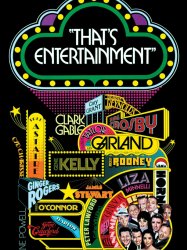
That's Entertainment! (1974)
, 2h15Directed by Jack Haley Jr.
Origin USA
Genres Documentary, Musical
Themes Films about films, Films about music and musicians, Documentary films about business, Documentary films about the film industry, Documentary films about cities, Musical films, Documentary films about films
Actors Frank Sinatra, Fred Astaire, Bing Crosby, Gene Kelly, Peter Lawford, Liza Minnelli
Roles Self - Host / Narrator
Rating77%





Cette nostalgique leçon d'histoire recèle les trésors cachés des plus grandes comédies musicales de la MGM ainsi que de nombreux autres extraits merveilleux mais moins célèbres, avec Esther Williams, Jimmy Durante, Eleanor Powell et même Clark Gable chantant et dansant. « Il était une fois Hollywood » est une véritable gourmandise pour cinéphiles et amateurs de comédies musicales.
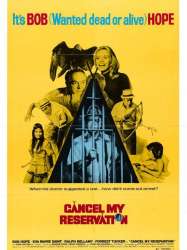
Cancel My Reservation (1972)
, 1h39Directed by Paul Bogart
Origin USA
Genres Comedy
Actors Bob Hope, Eva Marie Saint, Ralph Bellamy, Forrest Tucker, Anne Archer, Keenan Wynn
Roles Himself (uncredited)
Rating49%





Television personality Dan Bartlett, having difficulties with his wife and TV co-star Sheila, retreats to his Arizona ranch. When the body of Mary Little Cloud is found in his car trunk, Dan is placed under arrest.
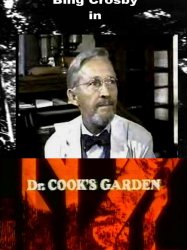
Dr. Cook's Garden (1971)
Directed by Ted Post
Origin USA
Genres Drama, Thriller
Actors Bing Crosby, Frank Converse, Blythe Danner, Barnard Hughes, Bethel Leslie, Helen Stenborg
Roles Leonard Cook
Rating70%





A young doctor returns to his New England home town after a long absence. He visits with the town's kindly old physician, Dr. Cook, a man he has admired since childhood. However, he soon finds out that the old doctor is keeping a mysterious secret.

The Movie Orgy (1968)
Directed by Joe Dante
Origin USA
Genres Comedy, Documentary, Historical
Themes Documentary films about business, Documentary films about the film industry
Actors Ann-Margret, John Lennon, Paul McCartney, George Harrison, Ringo Starr, Walter Brennan
Roles Self (archive footage)
Rating77%





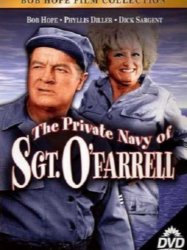 , 1h32
, 1h32Directed by Frank Tashlin
Origin USA
Genres War, Comedy
Themes Seafaring films, Transport films
Actors Bob Hope, Phyllis Diller, Jeffrey Hunter, Mako Iwamatsu, Henry Wilcoxon, Dick Sargent
Roles Self (archive footage) (uncredited)
Rating58%





Master Sergeant Dan O'Farrell is a G.I. on an island somewhere in the South Pacific during World War II, bemoaning the consequences of a ship torpedoed while ferrying to the island a desperately needed cargo of beer.
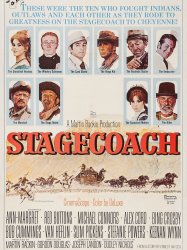
Stagecoach (1966)
, 1h55Directed by Gordon Douglas
Origin USA
Genres Action, Western
Themes Children's films
Actors Bing Crosby, Ann-Margret, Red Buttons, Alex Cord, Slim Pickens, Mike Connors
Roles Doc Josiah Boone
Rating60%





Une diligence tente de traverser une contrée désertique contrôlée par les Indiens. Lors d'une étape, les passagers de la diligence découvrent que toutes les personnes ont été massacrées. Ils vont devoir affronter l'attaque de leur convoi au cours d'une chevauchée dangereuse.
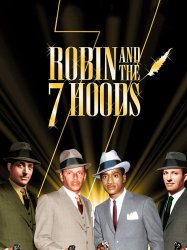
Robin and the 7 Hoods (1964)
, 2h3Directed by Bing Crosby, Peter Falk, Dean Martin, Edward G. Robinson, Frank Sinatra, Sammy Davis Jr., Gordon Douglas
Origin USA
Genres Drama, Comedy, Musical theatre, Action, Adventure, Musical, Crime
Themes Films about music and musicians, Musical films, Heist films, Gangster films
Actors Frank Sinatra, Dean Martin, Sammy Davis Jr., Bing Crosby, Peter Falk, Edward G. Robinson
Roles Allen A. Dale
Rating63%





"Big" Jim Stevens, undisputed boss of the Chicago underworld, gets an unexpected birthday present from his ambitious lieutenant, Guy Gisborne. Instead of a stripper popping out of the cake, Big Jim gets shot by all the guests. With the mob boss out of the way, Gisborne takes over. He orders all the other gangsters in town to pay him protection money, but declares it's still "All for One." The news does not sit well with Big Jim's friend and fellow gangster, Robbo, and a gangland war breaks out.
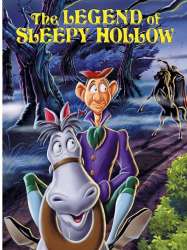
The Legend of Sleepy Hollow (1963)
, 34minutesDirected by Clyde Geronimi, James Algar, Jack Kinney
Origin USA
Genres Horror, Animation
Themes Children's films
Actors Bing Crosby, Pinto Colvig, Billy Bletcher, Clarence Nash, Daniel Beretta
Roles Narrator
Rating76%





Inspirée de La Légende de Sleepy Hollow de Washington Irving (1820), La Légende de la Vallée endormie raconte l'histoire d'Ichabod Crane qui, un jour d'automne, est nommé instituteur dans le village de Sleepy Hollow. Arrivé sur les lieux, il rencontre la plus belle jeune femme du village, Katrina Van Tassel, fille d'un riche propriétaire terrien, dont il tombe immédiatement amoureux. Il réussit à écarter Katrina de Brom Bones, la brute de la bourgade qui aime lui aussi la séduire. Furieux, Brom Bones décide pour se venger de raconter aux villageois l'effrayante légende du Cavalier sans tête lors de la soirée d'Halloween organisée par le père de Katrina. Mais après la fête, Ichabod doit rentrer seul chez lui, en pleine nuit, en passant par la forêt…

The Road to Hong Kong (1962)
, 1h31Directed by Norman Panama, Melvin Frank
Origin United-kingdom
Genres Science fiction, Comedy, Musical, Romance
Themes Films about films, Spy films, Films about music and musicians, Films about Tibet, Transport films, Films about automobiles, Comedy science fiction films, Musical films, Road movies, Buddy films
Actors Bing Crosby, Bob Hope, Joan Collins, Robert Morley, Walter Gotell, Dorothy Lamour
Roles Harry Turner
Rating60%





The story is told in flashback as Diane (Joan Collins) explains to American Intelligence how transmissions from passengers picked up from a missile to the moon are by Americans rather than Russians.
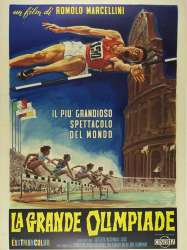
The Grand Olympics (1961)
, 2h22Directed by Romolo Marcellini
Genres Documentary
Themes Sports films, Documentary films about sports, Films about the Olympic Games
Actors Bing Crosby
Roles Himself
Rating67%





142 minutes of the film speak of events and athletes that have characterized the 1960 Summer Olympics in Rome. From the absolute protagonist Wilma Rudolph, called the black gazelle, to Livio Berruti, the first white to win the 200 meters, to the deeds of Ethiopian marathon runner Abebe Bikila, who won the marathon racing barefoot.
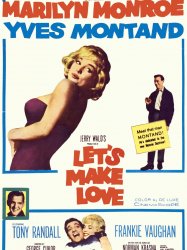
Let's Make Love (1960)
, 1h59Directed by George Cukor, David S. Hall
Origin USA
Genres Comedy, Musical theatre, Romantic comedy, Musical, Romance
Themes Films about music and musicians, Musical films, Children's films
Actors Marilyn Monroe, Yves Montand, Tony Randall, Frankie Vaughan, Wilfrid Hyde-White, David Burns
Roles Bing Crosby (uncredited)
Rating63%





The plot revolves around billionaire Jean-Marc Clement (Montand) who learns that he is to be satirized in an off-Broadway revue. After going to the theatre, he sees Amanda Dell (Monroe) rehearsing the Cole Porter song "My Heart Belongs to Daddy", and by accident the director thinks him an actor suitable to play himself in the revue. Clement takes the part in order to see more of Amanda and plays along with the mistaken identity, going by the name Alexander Dumas.
 Connection
Connection
